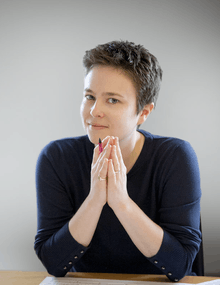Emily Howard
| Emily Howard | |
|---|---|
 | |
| Born | 23 February 1979 |
| Nationality | British |
| Occupation | Composer |
| Notable work |
Torus (2016) Afference (2014) Calculus of the Nervous System (2011) Magnetite (2007) |
| Website | www.emilyhoward.com |
Emily Howard (born 1979) is a British composer from Liverpool.
Life and career
As a child, Howard learned to play chess (British Junior Girls Chess Champion for 6 years (1990 U11, 1991 U12,1992 U16, 1993 U14, 1994 U15/U16, 1996 U18) and the cello, whilst also writing compositions for local ensembles and orchestras. After completing a degree in mathematics and computation at Lincoln College, Oxford, Howard studied composition at the Royal Northern College of Music. She holds a doctorate in composition from the University of Manchester.[1][2]
In 2008 Howard received the Paul Hamlyn Award for Composers.[3] In 2010 she became the inaugural UBS Composer in Residence in conjunction with the London Symphony Orchestra at the Bridge Academy in Hackney. In 2012, Howard won a British Composer Award for Mesmerism. She was a Leverhulme Trust Artist in Residence at the University of Liverpool's Department of Mathematical Sciences in 2015 and is currently a Visiting Senior Fellow.
Howard is a Senior Lecturer in Composition at the Royal Northern College of Music in Manchester and a Visiting Researcher at the Oxford e-Research Centre.
Released in 2016, Howard's NMC Debut Disc 'Magnetite' was well received by critics.[4][5] Commissioned for premiere at the BBC Proms 2016, Torus (Concerto for Orchestra) was described by The Times as "visionary" and by The Guardian as "one of this year's finest new works".[6][7] Howard's string quartet Afference has been short-listed for a British Composer Award 2016.[8]
Selected works
Works for orchestra
- Sphere, short piece for orchestra, 2017, first performance 9 March 2017 by the Bamberg Symphony Orchestra (conductor: Alondra de la Parra), in Schweinfurt, Germany
- Torus, concerto for orchestra, 2016 (commissioned by BBC and Royal Liverpool Philharmonic Orchestra), first performance 25 August 2016, BBC Proms, London
- Axon for large orchestra, 2013 (commission by BBC Radio 3, first performance 1 November 2013, Manchester)[9]
- Calculus Of The Nervous System for symphony orchestra, 2011 (Wien Modern 2011 Festival Commission)[2][10]
- Ada Sketches, Mesmerism and Calculus of the Nervous System form The Lovelace Trilogy, linked by Howard's interest in mathematician Ada Lovelace)[2][11]
- Mesmerism for solo piano and chamber orchestra, 2011
- Solar for large orchestra, 2010
- Magnetite for large orchestra, 2007
- Lachrimae Antiquae Novae for large symphony orchestra, 2007
- Lachrymose for chamber orchestra, 2006
- Passacaglia for string orchestra, 2002
Operatic and stage works
- Zátopek!, chamber opera, 2012 (commissioned for the 2012 Cultural Olympiad, 1st performance 15 June 2012, Epstein Theatre, Liverpool)[10][11][12]
- Ada sketches for mezzo-soprano, flute, clarinet and percussion, 2011
- Songs from Dickens for mezzo-soprano, speaker and piano trio, 2010
Chamber and solo works
- Chaos or Chess for solo tuba, 2016
- Orbits for soprano saxophone and crotales, 2015
- Leviathan for baritone saxophone and percussion, 2015
- Afference for string quartet, 2014–15
- Zugzwänge for clarinet quintet, 2012
- Angry Bird for alto saxophone and vibraphone
- evolve for solo clarinet, 2015
- Masquerade for basset clarinet and piano, 2009
- Broken Hierarchies II for piano trio, 2009
- Cloud Chamber for clarinet and piano, 2006
- Sky and Water for solo piano, 2005
Vocal and choral works
- Threnos for two voices, 2015
- Two Songs after Friday Afternoons for children's choir and piano, 2013
- Wild Clematis in Winter for mezzo-soprano and piano, 2008
- Ite Fortes for solo violin and chamber choir, 2006
Works for ensemble / mixed media
- Carillon for solo turntablist and large ensemble with electronics, 2012–13
- Deconstruction V for amplified chamber ensemble (piano, electric guitar, violin, violoncello, percussion), 2012
- Simple Remains for mixed ensemble and film, 2010
- Prayer for wind orchestra, 2010
- Obsidian for brass band, 2010
- Settle for mixed ensemble and film, 2009–10
- Broken Hierarchies for cello ensemble, 2008
- Deep Soul Diving for wind orchestra, 2006
- The Summoning of Mephisto for chamber ensemble and film, 2007
- Dualities for large ensemble, 2005
References
- ↑ Interview, Financial Times (UK edition) Oct. 1–2, 2011.
- 1 2 3 "Emily Howard: Lecturer in Composition". Royal Northern College of Music. Retrieved 6 November 2013.
- ↑ http://artists.phf.org.uk/previous-awards/
- ↑ http://www.nmcrec.co.uk/recording/magnetite
- ↑ https://www.theguardian.com/music/2016/aug/21/emily-howard-magnetite-cd-review-rlpo-elias-string-quartet
- ↑ http://www.thetimes.co.uk/article/concert-prom-53-rlpo-petrenko-at-the-royal-albert-hall-wmqdz6wvt
- ↑ https://www.theguardian.com/music/2016/sep/12/bbc-proms-2016-highlights-guardian-critics-readers
- ↑ http://britishcomposerawards.com/shortlist.php
- ↑ Beale, Robert (4 November 2013). "Review: BBC Philharmonic @ Bridgewater Hall". Manchester Evening News. Retrieved 6 November 2013.
- 1 2 Youngs, Ian (15 June 2012). "London 2012: Opera recalls Olympic hero Emil Zatopek". BBC News.
- 1 2 Battle, Laura (30 September 2011). "Calculated compositions". Financial Times. Retrieved 6 November 2013.
- ↑ Hickling, Alfred (18 June 2012). "Zátopek! – review". The Guardian. Retrieved 6 November 2013.
Further reading
- Petri-Preis, Axel. Emily Howard's Lovelace Trilogy: A Musical Homage to a Mathematical Pioneer, Tempo, Vol.67, Issue No.265 (July 2013) (Cambridge University Press 2013).